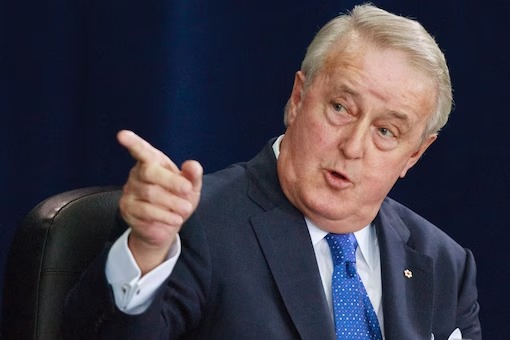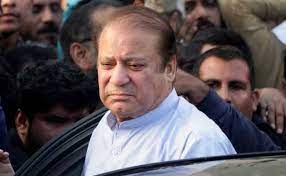The Father of North American Free Trade, Former Canadian Prime Minister Brian Mulroney, Dies at 84
Brian Mulroney, the former prime minister of Canada, died away on Thursday at the age of 84. In the 1980s, he gained notoriety in politics by striking a free trade deal with the US, which subsequently extended to Mexico.

Ontario MP Caroline Mulroney said on X, “It is with great sadness we announce the passing of my father.” “He passed away quietly, surrounded by his family.” The last leader of Canada during the Cold War, Brian Mulroney, worked with Washington to negotiate a historic acid rain deal while opposing apartheid in South Africa.
MULRONEY: WHO WAS SHE?
Mulroney, a baritone vocalist and aspiring lawyer by trade, had dazzling blue eyes and a lovely demeanor. Both French and English, which are the national languages of Canada, came naturally to him. For a short while, he left his retirement to counsel current Prime Minister Justin Trudeau on a revised trade agreement for the continent. Trudeau praised “Mr. Mulroney’s role in building the modern, dynamic, and prosperous country we all know today,” saying, “I’ll never forget the insights he shared with me over the years — he was generous, tireless, and incredibly passionate.”
Mulroney was born in Quebec on March 20, 1939, into an Irish-American family. At the age of 16, he enrolled in university and became associated with the Progressive Conservatives, which is now the Conservative Party. He entered politics as soon as he graduated from law school, running for party leadership in 1976. After losing, he accepted a position as mining business CEO. He had not reached forty yet. He returned to politics in 1983, this time to compete for and win the role of official opposition leader.
With the greatest majority government in history, Mulroney’s Progressive Conservatives ended almost two decades of Liberal dominance in Ottawa a year later. His promise to include his home Quebec into Canada’s constitution served as the foundation for that overwhelming win. The French-speaking province did not ratify a new constitution in 1982 after Ottawa rejected its requests for more powers since it had attempted to secede from the rest of Canada in 1980. Mulroney pledged to have Quebec acknowledged as a “distinct society” in the Canadian context. However, controversies forced many of his ministers to leave, making his first year in office difficult.
ADVOCATE FOR FREE TRADE
Mulroney opposed South Africa’s pro-apartheid government on the international scene, which caused him to differ with British Prime Minister Margaret Thatcher. His most significant accomplishment in terms of foreign policy, however, was the warming of relations with the US under Ronald Reagan and the subsequent breakthrough in trade relations. In an interview with Radio-Canada, he remembered, “I told him: Ronald, I want a comprehensive free trade agreement with you and the United States.”
The talks got underway in March 1985. When the two leaders—who are both of Irish descent—performed a rendition of “When Irish Eyes are Smiling” as the “Shamrock Summit” came to an end, the media took notice. Three years later, a compromise was reached, but many Canadians were skeptical of the result, with opposition parties charging Mulroney of too conceding.
Free trade would be the subject of a referendum in the 1988 election. Mulroney prevailed, and the agreement was put into effect. The North American Free Trade Agreement (NAFTA), which included Mexico and quickly succeeded the accord, established one of the biggest commercial blocs in the world. “In general, it’s been successful,” he said in a 2012 interview with the CBC. “I never saw it as a panacea, but it hasn’t been that either.”
DISGRACE
The government was compelled to increase taxes during Mulroney’s second term due to a severe recession, which culminated in a record-high deficit in his last year in office. His proposed constitutional amendments failed because they were seen as being overly pro-Quebec and were thus rejected. Later, he would remember, “It was the worst moment of my life.” In addition, Mulroney managed the privatization of one-third of the more than sixty state-run companies, including Air Canada, and he instituted a goods and services tax.
His popularity had completely collapsed by the time he resigned in 1993, with only 11% of the vote, making him the least popular prime minister in Canadian history. Less than three months after his departure, the Tories lost a humiliating election that resulted in the loss of two of their 151 members in the House of Commons. Mulroney was embroiled in a bribery controversy shortly thereafter. He was criticized by a panel of inquiry for accepting more than $200,000 in cash from German-Canadian armaments dealer and Airbus broker Karlheinz Schreiber during transactions with Air Canada.
Three covert hotel encounters had seen the money exchanged in brown paper bags. In the end, Mulroney acknowledged that he was wrong to take the money. At Trudeau’s request, Mulroney momentarily exited retirement in 2017 to provide advice on a new continental trade agreement. He spent months working behind the scenes to persuade Donald Trump, his sporadic golfing companion, to stay in the negotiations to renegotiate NAFTA. In July 2020, a new accord known as the United States-Mexico-Canada Agreement went into force.







